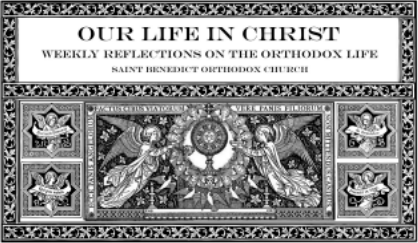Reflections on Prayer
“If you do not feel like praying, you have to force yourself. The Holy
Fathers say that prayer with force is higher than prayer unforced. You
do not want to, but force yourself. The Kingdom of Heaven is taken
by force.” ~ St. Ambrose of Optina (+1891)
Reflections on the Sacrament of Confession
“If the serpent, the devil, bites someone secretly, he infects that
person with the venom of sin. And if the one who has been bitten
keeps silence and does not do penance, and does not want to confess
his wound . . . then his brother and his master, who have the word [of
absolution] that will cure him, cannot very well assist him.”
~ St. Jerome
“Vanity of vanities, says the Teacher, vanity of vanities! All is vanity. What
do people gain from all the toil at which they toil under the sun?”
(Ecclesiastes 1.1-3).
Detachment: The Goal of our Approach to Material Things
“Detachment is the goal of all Orthodox Christians, lay people,
monastics and clergy. Those who wish to attain to purity of
heart, and thereby the kingdom of God, must strive for a
spiritual and mental state of absolute detachment from the
material things of the world” (Opperwall 131).
What is Detachment?
Detachment is the state of the enlightened person. He
recognizes the neutrality of all material things or events, and
remains at peace in times of prosperity or calamity. His heart is
fixed entirely on spiritual and eternal matters.
Abba Paphnutius describes three kinds of renunciation. The
second two are the highest, and do not depend on the first:
1st – Selling all possessions and embracing complete poverty
2nd – Eradicating desire for material things
3rd – Desiring only spiritual things
The Burden of Prosperity: Trap of Slavery
We seek comfort in prosperity only to find increased anxiety and
fear. Abba Abraham writes: “When the easiness of Christ’s yoke
and the lightness of his burden have become onerous to us,
thanks to the distortion of desire, and when we are tied up in…
the bonds of those things — that same property — that we kept
for the sake of our respite and solace, [the devil] will repeatedly
torment us with the lash of worldly cares, drawing from us —
from our very selves — that by which he tears us apart” (135).
Seeing this in our modern life:
“Abba Abraham’s words ought to ring true to any of us today…
We lay people live in a world of near endless bills and expenses.
The mortgage on our comfortable house comes due each
month…The car that was meant to get us to our destination in
style now needs repairs…We lie awake at night worrying if we
have put enough away for our retirement…In every case, we find
ourselves lulled into assuming that our material goods all make
our lives more comfortable, only to find ourselves working longer
hours away from the family, getting snippy with our friends out
of stress, and cutting back on our support of charities and the
Church just to pay for them all” (Opperwall 136).
Recognize the Hook in Pleasures
We should not disdain prosperity or regard wealth as bad.
Rather, we should recognize that it comes with greater
temptation and potential for misery. There is a hook in every
pleasure. Remember the cost.
“Prosperity, then, is a real spiritual risk. When we have a lot, we
tend to be entangled in our possessions and separated from our
pursuit of purity of heart” (137).
Yet, prosperity is not always bad, and has potential for good.
Abba John gave thanks for the donors of the monastery and all
charity workers: “I am certainly delighted, oh children, by the
pious generosity of your donations…By this, you faithfully offer
your first-fruits and tithe for the benefit of the poor, like a sweetsmelling sacrifice to the Lord” (137).
Blessing of Hardship
We should regard all material and financial hardship as a great
blessing.
Abba Paphnutius: “After having been bound up with the riches
and pleasures of this world, we are basically pushed suddenly
and against our will toward God…by trials that assault us.
Perhaps we are threatened by the risk of death, or hit with the
loss or seizure of our goods, or pierced by the death of a loved
one…[In these cases, we see that] people have emerged as
perfect, and exceptionally fervent in spirit” (139).
Opperwall: “If it is approached with the right attitude…if
material loss turns our minds from what is fleeting in the world
to what is eternal beyond it, then such loss is a spiritual blessing
indeed” (139).
Suffering from Material Loss Reveals Your Need to Grow
“If we find ourselves suffering over material loss, this experience
should become, through discretion, a reminder of how far we
still have to go in our pursuit of purity of heart, how deep our
entanglements in the world continue to be, and how great our
humility ought to be in light of these realizations” (140).
Virtue of Balance
Abba Theodore: “Go in a straight line, always walking on the
royal road, never disturbed from a state of tranquility by the
arrival of joy (on the right) nor driven back (to the left) by
assaults of adversity and the power of sadness” (141).
Balance leads to peace.

